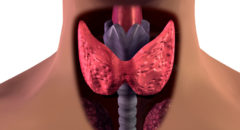How much do you know about your thyroid? This small, butterfly-shaped gland in your neck may not be something that you think about when you first awaken. Your thyroid is a powerful organ that plays an essential role in your body–releasing and controlling thyroid hormones that regulate your metabolism. Every cell in your body depends upon this process to properly function.
Understanding how your metabolism works and what impacts it is important. Metabolism refers to your body’s ability to break down food and turn it into the energy you need to survive. This process wouldn’t happen without the thyroid glands using iodine from food to produce and secrete two key hormones into your bloodstream: Triiodothyronine (T3) and thyroxine (T4). The T3 and T4 thyroid hormones play vital roles in regulating your body’s weight, skin, hair, brain development, metabolic rate, internal temperature and more. The occurrence of too much or too little thyroid hormones can negatively impact your body.






